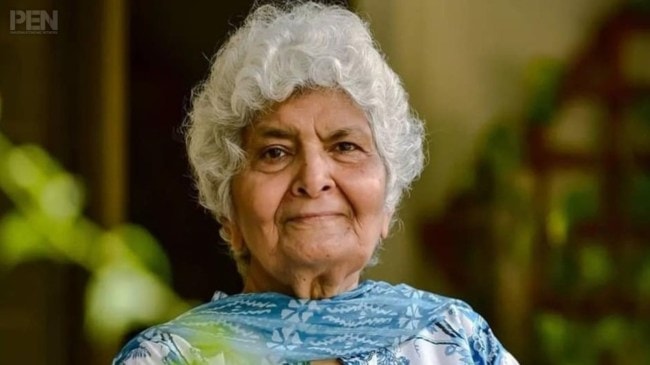Opinion What Arfa Sayeda Zehra taught us about Urdu, ethics and grace
Through her career, she showed that speech without compassion and ethics empties both language and faith of meaning
 An uncompromising champion of women's rights, Arfa Apa was a fearless critic of authoritarian regimes that shaped the political landscape of her homeland.
An uncompromising champion of women's rights, Arfa Apa was a fearless critic of authoritarian regimes that shaped the political landscape of her homeland. For several years, social media has been fascinated by an extraordinary presence: A petite elderly lady with cropped grey hair, speaking in mesmerising Urdu. Her speech pellucid, her words measured, she talked about the beauty of language and our composite culture, of human dignity and compassion, and of women’s rights, in ways few had heard before. Her name was Arfa Sayeda Zehra, and she passed away in Lahore on Monday, leaving behind a legacy that will endure far beyond her years.
Arfa Apa, as I (and many others) called her, represented a rare breed — the last of a generation that exemplified the very best of our shared cultural heritage. I remember, years ago, having a conversation with her at a literature festival. At some point in our discussion, I asked her to answer a basic question: What is Urdu? She paused momentarily, and with a twinkle in her eye as if she was about to let me in on a secret, said: “Saif mian, Urdu sirf ek zabaan ka nahin, ek mukammal tehzeeb ka naam hai (Urdu is not just a language, it is an entire culture)”. A complete culture is not just speech, but a lived experience, the sum of how one lives, thinks, feels, and navigates the world; and it was this wholeness she dedicated her entire life to protect. This conviction was evident in virtually every statement she made, often with disarming wit. Of the impossibility of translating cultural experience, she would say: “Kofte mein jo maza hai wo kabhi meatballs mein ho hi nahin sakta (the joy of kofta can never be experienced in meatballs).”
There are certain words in Urdu for which there are no English equivalents; among them are akhlaaq and khuloos. The word akhlaaq has been translated differently as “etiquette” or “refined manners”, and khuloos as “genuineness” or “sincerity”, but none of these convey the essence of the original even remotely. While khuloos is also typified by an underlying element of lovingness and warmth, akhlaaq entails a certain enduring attachment to one’s social values. Arfa Apa embodied both and insisted that they were the bedrock of human interaction. I once ran into her at Karachi airport. She waited until I was safely settled in my host’s car, and insisted on paying the porter herself, gently reminding me that not only was I a guest, she was also my buzurg.
For Arfa Apa, language and character were inextricably intertwined, and the cultivation of speech reflected the cultivation of the self. She frequently cautioned: Akhlaaq ke baghairmazhab ka chehra bohot bhayanak hota hai (without ethics, religion has a terrifying visage). This was a principle she followed and protected with immense grace. On one occasion at the Karachi Literature Festival, a well-known British-Pakistani writer bemoaned that “desi” workers around the world were “lazy and useless”. Arfa Apa tore into his speech but without being disagreeable, demonstrating to her listeners that dissent and civility are not mutually exclusive.
As an orator, Arfa Apa stood unmatched. Although a quintessential Lahori, her speech embodied the elegance of Lucknowi tehzeeb, her accounts of her encounter with which during her brief stay in the city became legendary. Audiences would implore her to repeat them the way children ask for their favourite bedtime stories. And each time, with her characteristic wry sense of humour, she would gently mock her own Lahori bluntness against Lucknow’s famed refinement. Her self-deprecating humour was an integral part of who she was. When Zarminae Ansari, founder of Joy of Urdu, asked her to suggest a name for their online poetry master class, she named them Arfa aur Zarminae ki himaaqatein (“The stupidities of Arfa and Zarminae”). The irreverently titled classes turned out to be a transformative pedagogical success.
An uncompromising champion of women’s rights, Arfa Apa was a fearless critic of authoritarian regimes that shaped the political landscape of her homeland. She would refer to General Ziaul Haq as mere mehboob (“my beloved”), reminding her people that humour can inflict deeper wounds than anger. A former professor of history and principal of Lahore College for Women University, she served as special advisor to the Prime Minister on Education and National Harmony, chairperson of the National Commission on Women, and as a Caretaker Provincial Minister. Throughout these influential roles, her contributions to public policy and civil society were guided by the same ethical framework that characterised her lifetime mission: A resolute commitment to justice, human dignity, and the primacy of dialogue. Above all, she was a thinker who married tradition with critique, and insisted that culture is not a static legacy, but a dynamic territory. In an era of vanishing grace, she personified the values we are at risk of losing.
Recordings will be available to play back, and quotes will be available to disseminate, but the real tribute to Arfa Apa would be to emulate her beliefs. Speak with the knowledge that your words can both harm and heal. Stand with the vulnerable. And when language fails, accept the untranslatable: Call a kofta a kofta and allow it to maintain its maza.
The writer is a London-based international lawyer, advocate, Supreme Court of India, author, and visiting academic at the University of Oxford, the UK






